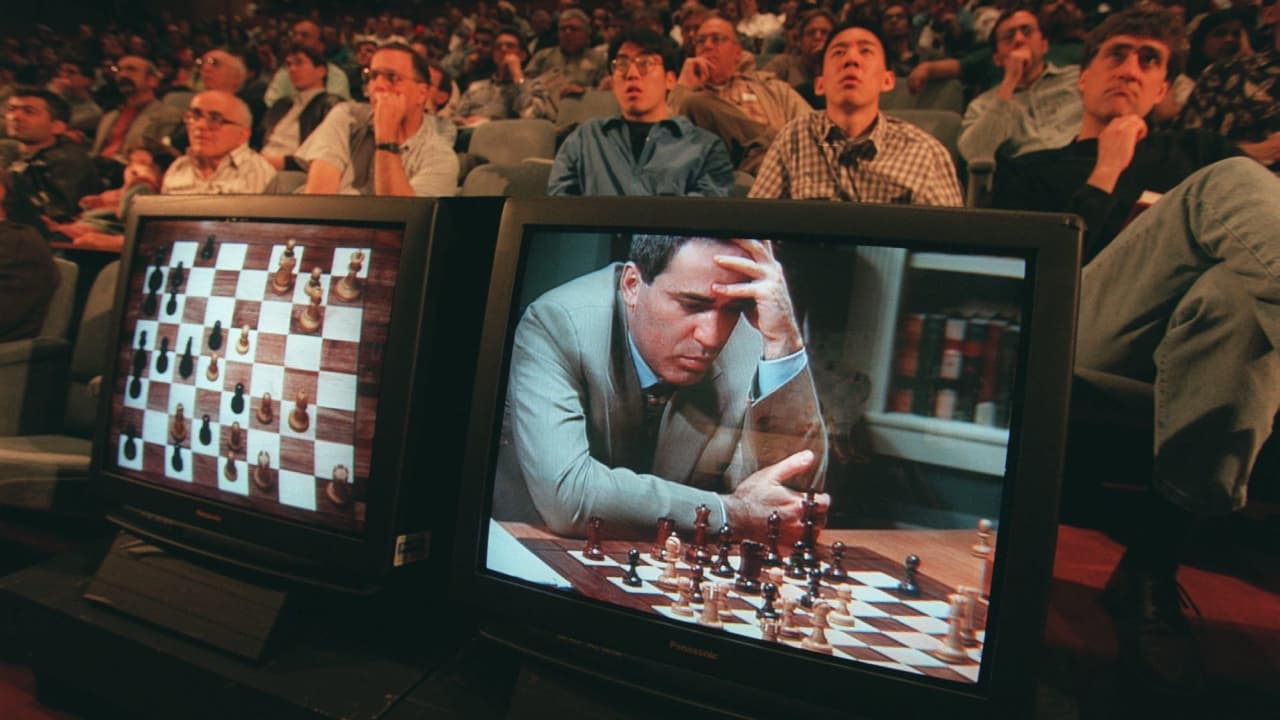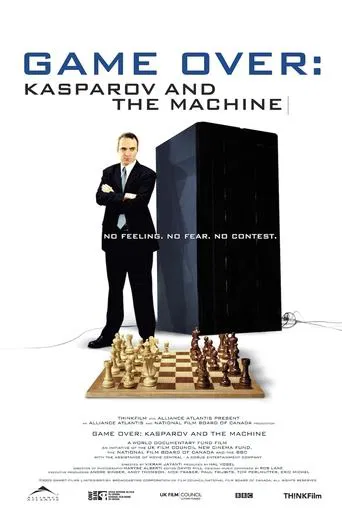


I decided to watch this documentary because it describes an event that I was too young (at the time) to appreciate...the first competitive chess match(es) between a human player--Garry Kasparov--and a machine--IBM's Deep Blue. Sadly, this take on the subject plays more like an independent student film or something, providing little substance and even less drama on a subject that could have had both.The problem with this documentary is that it breaks what is basically the cardinal rule of documentaries: it somehow manages to make its subject even LESS exciting than the events that actually took place. It provides very little context to the events, and even the context it does provide just bogs down the real-life story. I compare this type of documentary to "King of Kong: A Fistful of Quarters" (which was vastly better). That doc takes two people playing a video game (not even really against each other) and turns it into an epic drama while delving into the history of the experience. Neither of those approaches show up in "Game Over".Sadly, this was a very disappointing experience. I had been quite excited to view this documentary, and I could tell right away that is was not going to be the quality that I had expected. I'll give it two stars because the idea/event behind is truly something interesting, but not a cent more. This subject deserves a much more professional treatment, that is for certain.
... View MoreI should first point out that I'm just a couple of ear hairs past novice level when it comes to chess, so I'm not a complete outsider to the subject at hand...just on the periphery. But I digress."Game Over" isn't a documentary so much as a position paper, the kind that an insecure college freshman with a chip on his shoulder would write for a first semester English class. (I should know.) There's tantalizing material here that the director, like a bad chess player, doesn't follow up on because he's fixated on other stuff that's more immediately gratifying. Mainly attacks.I'll get this out of the way now: the film is unapologetically biased. The director's reverential attitude toward Garry Kasparov and contempt for the IBM team comes through loud and clear in just about every frame. There is no ambiguity--no real ambiguity, just the "you decide" kind that's so common in those paranormal-themed TV shows on the Discovery Channel where you just know what *they* think the truth is. The film takes Kasparov's assertions at face value: *of course* IBM must have had human hands behind the scenes helping Deep Blue; they had to have been playing mind games to break him; naturally they wouldn't let him look at the logs--something fishy's going on! When the IBM boffins get the camera, every single one is made to look like an arrogant, lying sum'bitch. The conspiracy angle is played up and up, bolstered by the now well-noted creepy (and very annoying) whispering and cutaways to The Turk. Our director (no, I don't remember his name and would be too impatient to keep typing it) doesn't let up on hammering his point into our heads, and certainly doesn't provide us with sufficient material to truly make up our own minds about What Really Happened. I won't take sides on that subject, other than to say that nowadays the idea of a computer trouncing a top Grandmaster certainly doesn't seem very controversial to me, although at the time I can understand how Kasparov could have gotten freaked.So what we have here could have been a good hour or so program on one of those cable channels that specializes in nonfiction programming. Yes, I'm sure they could have pruned it down into a much tighter picture if they'd just lost all the superfluous Turk and eerie-corridor shots, not to mention annoying commentary from Kasparov's manager and others.But that's not what's really fascinating in this movie. Even without the kooky paranoia angle (except that which comes straight from Kasparov) we have a very compelling human drama waiting to be explored: man vs machine; man vs corporation; man vs his own ego, reputation, and past. Kasparov is an engaging and complex figure, cocky at the beginning, perplexed and frantic in the middle, and vulnerable and all too human at the end. The unbeatable met his match and it changed him irrevocably; the story of Kasparov vs Deep Blue is classic tragedy. Even the programming team didn't get to gloat. I would have liked to hear more about why, in the words of the lead Asian programmer, "it sucked".But villains don't get to tell their side of the story, and I doubt our director knew that he had a classic tragedy to tell, or even what tragedy is. (I also don't get much sense that he knows much about chess itself either.) In his hands, it's just plain old melodrama--based, as they say on TV, on a true story. Good guys, bad guys, and a lot of padding. I basically would have preferred if Kasparov and the IBM people would have just been allowed to tell their stories in their own way, they're clearly interesting enough subjects without the "help" of the director's editorializing...but WITH the help of position diagrams, commentary on the games themselves from chess masters, etc. That might have given even lay viewers some context, an appreciation of the deeply complex analysis over which gray matter grappled with silicon.It's reasonably well-made, though, from a technical standpoint. There's some nice camera-work and editing too, just not enough, and at the same time too much. Ponder what "Game Over" (no subtitle) would have looked like in the hands of, say, Frederick Wiseman. Just as an experiment.
... View MoreA retrospective on the series of matches played between world chess grandmaster Garry Kasparov and Deep Blue, IBM's specially-developed thinking machine, in which both sides come off as snide, arrogant and obsessively self-absorbed. IBM, it would seem, used the encounter as a highly successful publicity stunt and, having achieved their ultimate goal of a victory against the best in the world, promptly closed up shop without ever offering a rubber match. But Kasparov, whose perspective plays driver for most of the documentary, doesn't slip so easily into the role of the rallying hero. The old master makes a few sound observations about the shroud of secrecy that surrounded his digital opponent during their fateful second meeting, but ultimately seems most interested in making excuses for his loss than sharing any new insight. Even the filmmakers do a questionable job of remaining unbiased, allowing each party to share their opinions without obstruction, but ultimately spending most of their effort focused on Kasparov's wild conspiracy theories. They also, puzzlingly, give away the ending no less than three times over the course of the picture, effectively killing the drama of the situation. As a result, this documentary never builds up a head of steam and winds up as little more than a straight, bland, historical record that lacks both a resolution and a truly appealing central figure.
... View MoreVikram Jayanti's documentary on the 1997 clash between IBM super-computer Deep Blue and Russian chess grand master Garry Kasparov is frustrating and fascinating in equal measure.Kasparov's insistence that IBM cheated (by using one or more chess masters to influence the computer during the match) seems perfectly possible, but the computer manufacturers refusal to allow either a rematch or analysis of their data makes it impossible to substantiate the claims. Sadly that doesn't stop Jayanti, his subjective approach is unaffected by the apparent stalemate.Fortunately the film has more to offer. The actual match becomes hugely dramatic and exciting in Jayanti's hands. Kasparov himself is an extremely enigmatic and passionate figure, the footage of him in the press conferences that took place after each of the six games is dynamite. In the second, he accuses IBM of cheating. In the last, after nine days of play, he appears on stage looking physically and mentally destroyed, the applause that greets him (and the boos for IBM) would seem to indicate a general feeling of suspicion of IBM's sportsmanship and honesty.Too subjective to be a 'great' documentary, it is still a fascinating insight into a game and community that would seem to offer much potential for future study.
... View More